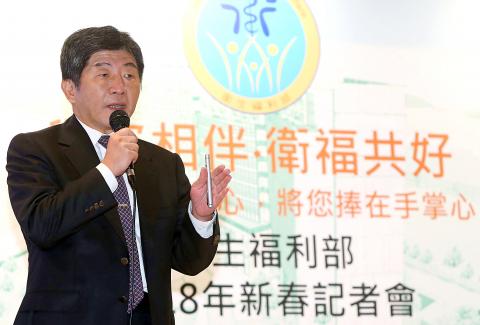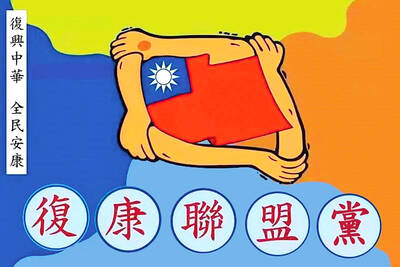The government might review its ban on food imports from five Japanese prefectures in line with global practice, Minister of Health and Welfare Chen Shih-chung (陳時中) said yesterday.
“It is time to reassess Taiwan’s policy on Japanese food imports. The government might follow the US and adopt risk-based restrictions, instead of the current regionally based ban,” Chen said.
Food imports from Fukushima, Ibaraki, Tochigi, Gunma and Chiba prefectures have been suspended since shortly after the Fukushima Dai-ichi nuclear power plant disaster in March 2011.

Photo: CNA
The government would not allow the entry of radiation-tainted food, but should ease the rules on non-contaminated products, which would be in line with international trade practices, Chen said.
The government must differentiate between “Japanese foods” and “radiation-tainted foods,” he said.
If food products from the prefectures are allowed to be imported, the ministry would do everything it can to ensure their safety, “but there is no timetable for that to happen,” Chen said.
“Taiwan cannot distance itself from the issue,” Deputy Minister of Health and Welfare Ho Chi-kung (何啟功) said. “It is not good to maintain the ban for so many years” when nations worldwide are gradually relaxing their restrictions.
“Some banned food products from the five prefectures are safe,” he said, adding that food at Chiba’s Narita International Airport might contain ingredients from the prefecture.
Chen and Ho’s remarks came just days after Taiwan-Japan Relations Association Deputy Secretary-General Fan Chen-kuo (范振國) said that continuation of the ban might jeopardize the nation’s bid to join the Comprehensive and Progressive Agreement for the Trans-Pacific Partnership.

AIR DEFENSE: The Norwegian missile system has proved highly effective in Ukraine in its war against Russia, and the US has recommended it for Taiwan, an expert said The Norwegian Advanced Surface-to-Air Missile Systems (NASAMS) Taiwan ordered from the US would be installed in strategically important positions in Taipei and New Taipei City to guard the region, the Ministry of National Defense said in statement yesterday. The air defense system would be deployed in Taipei’s Songshan District (松山) and New Taipei City’s Tamsui District (淡水), the ministry said, adding that the systems could be delivered as soon as the end of this year. The US Defense Security Cooperation Agency has previously said that three NASAMS would be sold to Taiwan. The weapons are part of the 17th US arms sale to

SERIOUS ALLEGATIONS: The suspects formed spy networks and paramilitary groups to kill government officials during a possible Chinese invasion, prosecutors said Prosecutors have indicted seven retired military officers, members of the Rehabilitation Alliance Party, for allegedly obtaining funds from China, and forming paramilitary groups and assassination squads in Taiwan to collaborate with Chinese troops in a possible war. The suspects contravened the National Security Act (國家安全法) by taking photos and drawing maps of key radar stations, missile installations and the American Institute in Taiwan’s headquarters in Taipei, prosecutors said. They allegedly prepared to collaborate with China during a possible invasion of Taiwan, prosecutors said. Retired military officer Chu Hung-i (屈宏義), 62, a Republic of China Army Academy graduate, went to China

INSURRECTION: The NSB said it found evidence the CCP was seeking snipers in Taiwan to target members of the military and foreign organizations in the event of an invasion The number of Chinese spies prosecuted in Taiwan has grown threefold over a four-year period, the National Security Bureau (NSB) said in a report released yesterday. In 2021 and 2022, 16 and 10 spies were prosecuted respectively, but that number grew to 64 last year, it said, adding that the Chinese Communist Party (CCP) was working with gangs in Taiwan to develop a network of armed spies. Spies in Taiwan have on behalf of the CCP used a variety of channels and methods to infiltrate all sectors of the country, and recruited Taiwanese to cooperate in developing organizations and obtaining sensitive information

BREAKTHROUGH: The US is making chips on par in yield and quality with Taiwan, despite people saying that it could not happen, the official said Taiwan Semiconductor Manufacturing Co (TSMC, 台積電) has begun producing advanced 4-nanometer (nm) chips for US customers in Arizona, US Secretary of Commerce Gina Raimondo said, a milestone in the semiconductor efforts of the administration of US President Joe Biden. In November last year, the commerce department finalized a US$6.6 billion grant to TSMC’s US unit for semiconductor production in Phoenix, Arizona. “For the first time ever in our country’s history, we are making leading edge 4-nanometer chips on American soil, American workers — on par in yield and quality with Taiwan,” Raimondo said, adding that production had begun in recent